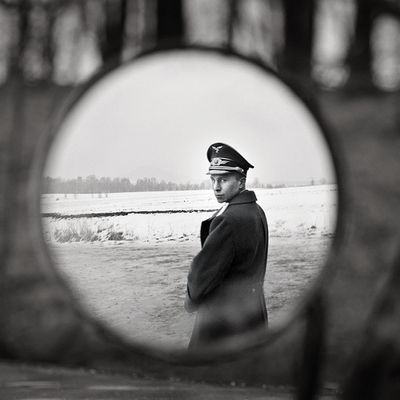
The Captain has the structure of a classic mistaken-identity farce and the tone of a serial-killer film. It’s too bleak to laugh at and too absurd to cry over. That it’s true adds another insanity-inducing element. But it was an insane time: April 1945, months from the end of World War II, when exhausted German soldiers deserted the collapsing front in huge numbers. One such deserter, a barefaced young private named “Willi” Herold (Max Hubacher), has scarcely escaped death at the hands of a vindictive German patrol when he comes upon an abandoned jeep and a suitcase containing the uniform of a Luftwaffe Hauptmann — a captain. After donning the captain’s heavy overcoat to stay warm, Herold begins to clown around, taking both sides of a dialogue between his own meek self and an imperious Nazi officer. That’s when another lone private, Freytag (Milan Peschel), spies him from afar and assumes that he’s the real thing. And so begins la commedia.
It’s a commedia with a single joke, though that joke becomes larger and more consequential at every stage: To escape detection — and certain death — the young Herold must not just pretend to be a captain, he must also exercise dominance over anyone liable to discover his secret. Again and again he’s challenged — Where are your papers? Who are you working for? What is your actual mission? — and again and again he gets the better of his challengers, either by demanding to see their papers, announcing that he’s working directly for the Führer, or, eventually, ordering executions willy-nilly. His “Task Force Herold” is composed of ex-deserters now charged with finding and killing other deserters. Only little Freytag seems to register the larger absurdity: that these men are in effect murdering themselves, mutatis mutandis. In a nihilistic endgame, says the captain, “if you’re not fucking death, death is fucking you” — which might have lost something in translation, but we get the gist.
Written and directed by Robert Schwentke, The Captain plays like political satire, of the kind that no American could have conceived. It flies in the face of our deeply held notions of individuality and free will: We’re convinced that both things exist, while Germans have learned from experience that identity is elastic and most wills are too weak to escape the pull of prevailing norms. If that sounds reductive, so is the film, but it’s the kind of reductiveness that kept Germans like Bertolt Brecht up at night, convinced that the world needed to be changed because humans — especially when starving — cannot be trusted to act without murderous self-interest. What Schwentke has identified are the story’s dramatic beats, those precise moments of decision in which trying not to be fucked by death becomes fucking death — which I’m sure would sound better with the requisite fricatives.
Schwentke must have felt that he was coming off a death-fuck when he started The Captain: He’d just made a hash of the last two Divergent movies — which, given the basic material, couldn’t have been good but might not have bombed so resoundingly. (Hollywood looks more fondly on serial killers than franchise killers.) I can almost hear Schwentke and his cinematographer, Florian Ballhaus, say, “Let’s get the nihilism right this time!” So they’ve shot The Captain in a black and white that’s both exquisite and stark, that eats into the mind, transforming a frigid landscape into a canvas suitable for existential tragedy.
Which is not to say The Captain has a tragic hero. Hubacher drains emotion from every feature except his eyes, which dart from side to side when he finds himself in yet another farcical corner and needs to take his game to the next, more lethal level. Eventually his face settles into a mask of entitlement, albeit pale and soft, like Conrad Veidt’s somnambulist in The Cabinet of Dr. Caligari — a fitting likeness given that the journey to evil is here a kind of sleepwalking, an instinct that takes over when all the other senses are worn down or plunged into chaos.
There are “good” Germans in The Captain, among them the placid head of a prisoner camp who watches men dig burial pits for their own future corpses and demands to know on whose authority Captain Willi Herold is acting. But for every man who objects, there are more who murder with a sense of relief, on the fallacious assumption that a bullet in someone else means one less in the world for them. It is lightly noted by a Nazi higher-up that, if nothing else, Willi Herold did much to “curb the defeatist mentality” in those he did not murder. We are left to contemplate this vision of Fascism as a machine that, once turned on, can sustain itself even in the absence of explicit direction from above. The key is keeping that infernal switch from being thrown.
*This article appears in the July 23, 2018, issue of New York Magazine. Subscribe Now!





